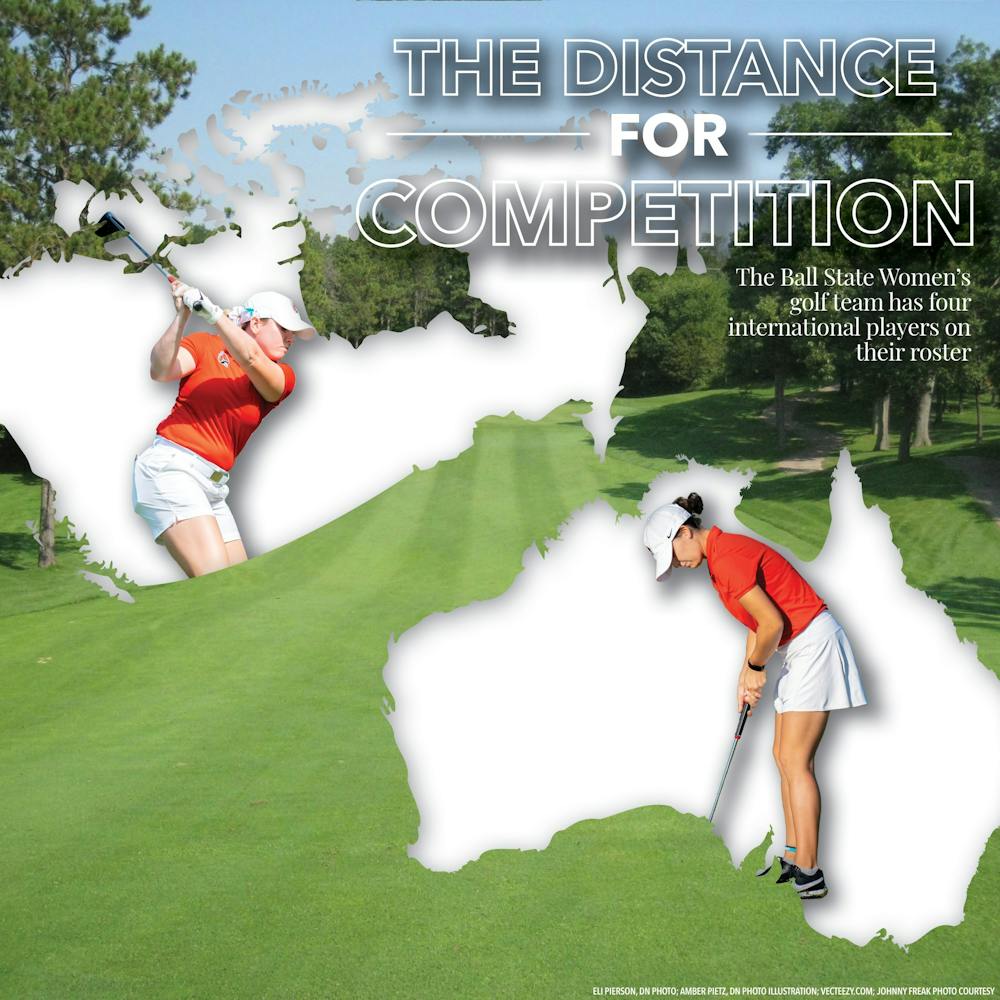The Ball State Women's Golf team has seven players on its roster – four of them are international players.
Second-year Payton Bennent, first-year Sarah Gallagher and first-year Madelin Boyd are all from Ontario, Canada. First-year Jasmine Driscoll is from the ‘land down under,’ coming all the way from Sydney, Australia, to play collegiate golf at Ball State.
“In Australia, college sports is really not a thing,” Driscoll said. “So if you wanted to go play at a high level, you’d just be playing by yourself. You’d be enrolling in tournaments by yourself, traveling by yourself and practicing by yourself. Whereas here, you do everything as a team.”
Golf in the U.S. has been on the rise since the COVID-19 pandemic. According to GolfDigest, around 500,000 people picked up golf in 2020 in America. Chain stores like the PGA Superstore reported a 70% increase in sales the past two years due to the golf wave in America, reported by Forbes.
In Bennett’s sectionals, there was only one other girl she competed with and players got to state very easily. Here in America, getting to state in golf is a bigger deal.
“People are excited about it, but in a different way,” Bennett said. “High school golf is nowhere near competitive to anything I have seen here [compared to Canada]. High school golf here is comparable to college golf here.”
Gallagher played for Team Ontario, and multiple other Canadian series for golf.
“The golf culture [in Canada] is a little like here in the U.S. The junior program is growing,” Gallagher said.
With golf on the rise in America, the distance between Muncie and Australia can also be the level of difference between golf cultures.
“Golf is more accepted as a sport that is played by younger people [in America],” Driscoll said. “Back at home if I told someone at my high school that I played golf, they would be like, ‘Why are you playing golf, it is for old people.’ Here everyone plays golf. You say you play golf, and people actually think that is cool. Here I find more women playing, whereas at home, it is still on the rise for women.”
Last year at the peak of the pandemic, the Canadian border was closed for entry and exit to America, and the border did not reopen fully until Sept. 7, 2021.
With the closure of the border, players at Ball State had trouble with family visitation.
“So my parents couldn't come down,” Bennett said. “No one could really come down and see me if I needed anything. It had to be shipped to me. So that was difficult right at the beginning, and it really showed how much of a difference there was, even though it's just Canada, you don't think it'd be much of a difference, but then when the border was closed and they couldn't come, it was a big struggle.”
For Boyd, learning about college golf in America sparked her interest to come to America and compete.
“I went to a golf tournament in the States, and there was a banquet and a lot of different university coaches came in and spoke about it [college golf in the U.S.],” Boyd said. “That is when I decided that it was a lot bigger and a pretty cool thing. All my junior events were in Canada, I mean it is kind of the same here.”
Driscoll said she was also inspired by a conference she attended on college golf in America.
“One day we had a camp and some person came and talked about college golf and their life in America,” Driscoll said. “[They spoke about] their life in America and how it was so much better than Australia. I started looking [into college golf in America] from there.”
Bennett’s original plan was to play hockey in America. She had grown up playing hockey at a super competitive level, and her friends committed to play here in the U.S. She talked about not having as many opportunities to be recruited since college coaches did not travel out of America, so her process was more “virtual.”
Whether it’s Australia or Canada, each player is now in the United States, away from their homes and family.
“This is definitely the longest I have been away from home and my parents,” Gallagher said. “I’ve been gone for two weeks at a time, but it's not comparable to this long. Luckily, I have been able to get used to it well.”
Contact Elijah Poe with comments at elijah.poe@bsu.edu or on Twitter @ElijahPoe4.





